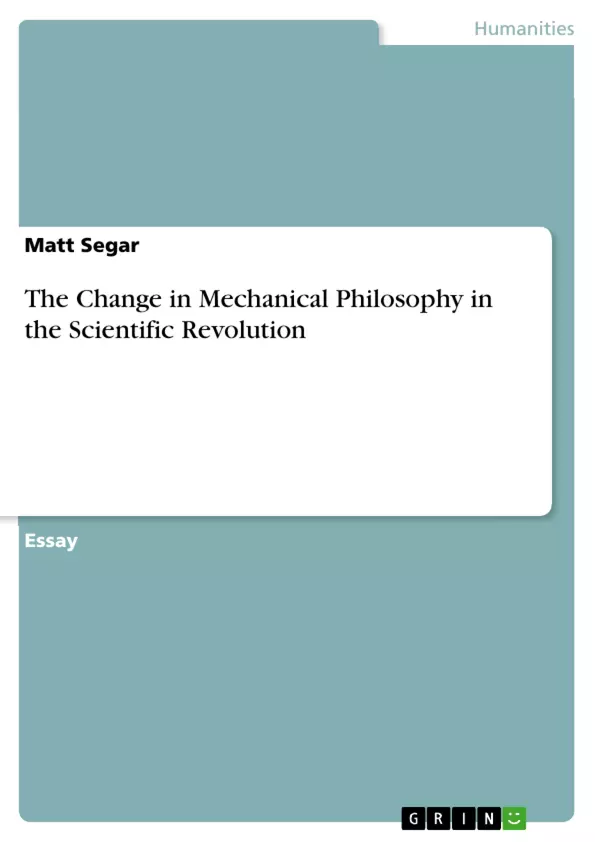Since ancient Greece, philosophers have wondered how objects come into existence. Aristotle proposed that everything was made by one of four reasons or causes. The mechanical cause describes how the object is composed. For instance, the mechanical cause of a tire is rubber. The formal cause describes the plans or pattern of an object, like a blueprint for a house, while the efficient cause is the cause/effect relations of an object, like an artist’s paint and brushes resulting in painting a picture. The final cause, however, is defined as, "the purpose, the good, or the end of something." For example, the final cause of a folder is to store papers.
Inhaltsverzeichnis (Table of Contents)
- The Change in Mechanical Philosophy in the Scientific Revolution
- Aristotle's Philosophy
- Medieval Period
- Scientific Revolution
Zielsetzung und Themenschwerpunkte (Objectives and Key Themes)
This text examines the transformation of mechanical philosophy during the Scientific Revolution. It delves into the evolution of the concept of causation and the shift from Aristotelian teleology to a more mechanistic view of the universe.
- Aristotle's philosophy of causation and its role in understanding the natural world
- Challenges to Aristotelian concepts in the medieval period
- The rise of mechanical philosophy during the Scientific Revolution
- The contributions of key figures like Descartes, Galileo, and Newton
- The impact of the change in mechanical philosophy on the understanding of nature and motion
Zusammenfassung der Kapitel (Chapter Summaries)
The text begins by introducing Aristotle's philosophy of causation, which posits four causes: mechanical, formal, efficient, and final. The final cause, or the purpose of an object, is particularly emphasized, highlighting its rejection in the Scientific Revolution.
The second part explores medieval scholars' challenges to Aristotelian ideas, focusing on the revival of Aristotle's works and the resulting debates within universities and the church.
The final section delves into the Scientific Revolution, highlighting the contributions of figures like Descartes, Galileo, and Newton. These scientists proposed a mechanical view of the universe, replacing the final cause with a focus on mathematical descriptions of matter and motion.
Schlüsselwörter (Keywords)
The key concepts explored in this text include mechanical philosophy, Aristotelian causation, final cause, Scientific Revolution, medieval science, Descartes, Galileo, Newton, motion, and the mathematical understanding of nature.
Frequently Asked Questions
What is mechanical philosophy?
It is a worldview that emerged during the Scientific Revolution, explaining natural phenomena through the motion and interaction of physical matter, similar to a machine.
How did Aristotle define causation?
Aristotle proposed four causes: material (composition), formal (blueprint), efficient (the act of making), and final (the purpose or end goal).
What changed during the Scientific Revolution regarding these causes?
Scientists like Descartes and Galileo rejected the "final cause" (teleology) in physics, focusing instead on mathematical descriptions and efficient causes.
What was Newton's contribution to mechanical philosophy?
Newton provided a mathematical framework for motion and gravity, further solidifying the view of a predictable, mechanistic universe governed by universal laws.
Why was the rejection of the "final cause" important?
It shifted science from asking "Why does this exist?" (purpose) to "How does this work?" (mechanism), enabling the development of modern physics and engineering.
- Quote paper
- Matt Segar (Author), 2009, The Change in Mechanical Philosophy in the Scientific Revolution, Munich, GRIN Verlag, https://www.grin.com/document/210743



